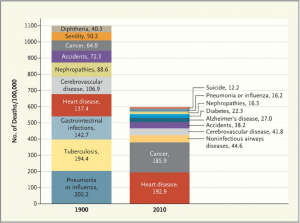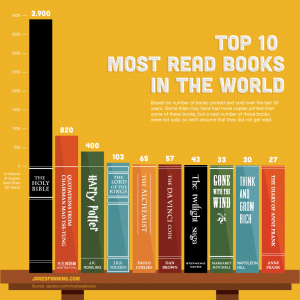People's social media usage habits while working are changing. According to the latest research by Palo Alto Networks, during the last six months (November 2011 to May 2012) the percentage of time workers spent on social networking sites shifted: Facebook: down 17% (from 54% to 37%) Twitter: up 10% (from 11% to 21%) Tumblr: up 9% (from 1% to 10%) So What? In only six months, the percentage of time people spent using Twitter at work doubled and the percentage of time they spent Read More …
Trends
What’s Killing Us? (#0773)
This past weekend I encountered a blog post that shared the leading causes of death in 1900 and in 2010 according to a recent piece in the New England Journal of Medicine. In 1900, five causes of death claimed at least 100 people per every 100,000: pneumonia or influenza: 202.2 tuberculosis: 194.4 gastrointestinal infections: 142.7 heart disease: 137.4 cerebrovascular disease: 106.9 By 2010 only two causes of death claimed at least 100 people per every 100,000: heart Read More …
From .org to .church? (#0770)
The continued growth of the internet means that if nothing changed we would run out of unique web addresses. Thankfully, those responsible for ensuring we can all continue to create new sites have solved this problem with something called IPv6. Earlier this month the Internet Corporation for Assigned Names and Numbers or ICAN started accepting applications from companies seeking new domain suffixes that included .apple, .google, and .church. So What? Most congregations now have Read More …
American Belief in God (#0767)
Americans have long been some of the world's most religious people. Wayne Baker, sociologist on the senior faculty of the University of Michigan Ross School of Business, recently blogged about research that confirms America remains near the top of the list of countries when it comes to the percentage of people who believe strongly in God without any doubts. More specifically, of the 30 countries included in the International Social Survey Program, the United States Read More …
Considerable Complexity – Social Marketing (#0761)
Many congregations are rethinking how they spend their limited marketing/advertising dollars. In most cases less and less money is allocated for print (phone book, direct mail, etc.) in order to free up additional funds for new media. While this shift seems logical, the next steps are far less clear. One of the troublesome aspects of entering this new arena is the considerable complexity of social marketing. The graphic below, from Buddy Media, illustrates this quite Read More …
Most Seniors Now Online (#0759)
It's official: most American adults age 65 or older are now online. According to the Pew Internet & American Life Project those age 65 and older are online more now than ever before: 53% use the internet or email (April 2012) 34% use social networking & 18% do so on a typical day (February 2012) So What? While usage rates are higher among the younger the population, the percentage of those in older age cohorts using the internet has continued to increase. Another Pew Read More …
Texters, Talkers, or ??? (#0758)
Martha Irvine's recent AP article considers how the rising popularity of texting is changing what it means to "talk to" others by phone. The percentage of cell phone users who prefer to communicate by text rather than voice is highest among the young, but continuing to rise for all age groups. So What? The art of communication is evolving as a result of the always connected world in which we now live. Regardless of age, one should aspire to be able to communicate well in both Read More …
Facebook Bible/Book Study? (#0755)
Many congregations offer fewer opportunities for adult discipleship during the summer months. With more and more adult learning and growth opportunities moving from an on campus (church building, someone's home, or a coffee shop) to either a blended (part on campus and part online) or online format, perhaps summer is the ideal time for your congregation to try something new online (or expand its existing efforts). There are so many possible ways to begin that many people get hung up Read More …
Membership & Worship Attendance (#0748)
Len Wilson just started a new job yesterday in "an executive creative and communication position" at Peachtree Presbyterian Church (Atlanta, GA), one of the largest Presbyterian congregations in America with an average worship attendance of around 7,000. Recently, he blogged about attendance and membership patterns in the United Methodist Church. In a rather comprehensive piece, he compared the ranks of the top twenty-five conferences by both membership and worship attendance. Read More …
Top 10 Most Read Books (#0746)
Jared Fanning recently made an infographic that has been making its way around the web. Fanning constructed the visual using data from a list compiled by freelance writer James Chapman that provides the number of copies each book sold over the last 50 years. So What? Saying that the Bible was the most sold or most read may be true, but understates its dominance. Together the books ranked #2 through #9 would yield a #2 book that would have only half the Read More …









